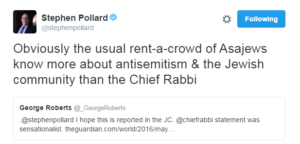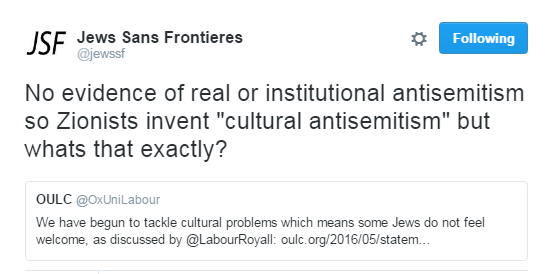In her exclusive blog post for the pro-Israel Jewish Labour Movement, Baroness Royall remarked that, although she found no evidence of institutional antisemitism,
There is too often a culture of intolerance where Jews are concerned and there are clear incidents of antisemitism. […] I am clear that in the OULC there is a cultural problem which means that Jewish students do not always feel welcome. And we have to take action to change this situation. Many students reported that should a Jewish student preface a remark “as a Jew …” they are likely to face ridicule and behaviour that would not be acceptable for someone saying “as a woman …” or “as an Afro-Caribbean”. This should not be tolerated.
The Chakrabarti inquiry vice-chair concluded,
We should not rest until we can be confident that Jews once more feel comfortable in all parts of our Party and Movement.
No details of these ‘clear incidents of antisemitism’ have been released. However, the example Royall uses to prove OULC is an unwelcome place for Jewish students is particularly interesting in light of the recent labelling of anti-Zionist Jews as ‘Asajews,’ by Israel supporters who want to reserve the right to this preface for Zionists.

It is worth investigating what statement follows this preface, however: is it an apology for Israel, or a criticism of Israel? Jews are entitled to invoke their Jewishness to strengthen their political point, but if they do so in an attempt to legitimise settler-colonialism and racial segregation, is it any wonder they are greeted with exasperation and even derision by human rights defenders, including other Jews?
Royall’s recommendation has been taken on board by the supine Oxford University Labour Club:
The issue of a ‘cultural’ problem and the discomfort of young pro-Israel Jews has been brilliantly analysed by Robert Cohen in his article in March, ‘Young liberal Zionists, if you’re serious about peace, let go and move on‘.
Cohen’s piece is worth reading in full; here is a long excerpt:
‘Fear, intimidation, distress and discomfort. That’s the lexicon of life for young liberal Zionists in Britain today. The pro-peace, anti-occupation, two-state supporting Jews are certainly having a rough time of it.
‘So why aren’t I more sympathetic? After all, doesn’t the fact that moderate well-meaning Jewish supporters of Israel are under attack, point to what really lies behind all of this hostility? Old fashioned, straight forward, anti-Semitism. And isn’t it the political left that’s stoking all the trouble this time around?
‘While I’ve no doubt that anti-Semitism exists in the Labour Party (and across the political spectrum for that matter) there’s a whole lot more to it than that. Something else is at play here. What we’re witnessing is an uncomfortable reckoning for young diaspora Jews who are unable to see or accept what has happened to Jews, Judaism and Jewish identity over the last 100 years.
‘[…] On the 15 February Alex Chalmers, the Jewish Co-chair of the Oxford University Labour Club, announced his resignation on Facebook after his fellow Labour Club members voted to support the forthcoming Israeli Apartheid Week activities on campus.
“…a large proportion of both Oxford University Labour Club and the student left in Oxford more generally have some kind of problem with Jews.”
‘He went on:
“Despite its avowed commitment to liberation, the attitude of certain members of the club towards certain disadvantaged groups was becoming poisonous.”
[…] ‘I know why it hurts
‘So a lot of unhappy and uncomfortable young Jews who think of themselves as progressive activists for Middle East peace. I can understand their pain. I too was stuck in the mindset of Liberal Zionism for far too long.
‘When young Yachad supporters at Kings College London wonder why talking peace is so objectionable, I can understand why. When Alex Chalmers thinks his fellow students have a problem with Jews, I’m not surprised he sees it that way. When Ellen Johnson feels upset seeing the Star of David worn as the uniform of the ‘bad guys’, I know why it hurts.
‘The cultural forces at play here are exceptionally powerful. Zionism has integrated into modern Jewish identity. So much so that most Jews, young and old, don’t even realise we are living in a politically constructed paradigm. Zionism is just a normal, natural way to understand the world. Why would you oppose it unless ‘you have a problem with Jews’.
‘And it’s not just Jewish identity. The practice of Judaism itself has undergone a successful merger with the modern State of Israel. We pray for the State of Israel in our Sabbath liturgy, along with its leaders and soldiers.
‘A miracle of liberation’
‘So the outlook of even the most progressive of Zionists is that we have ‘returned’ to ‘our’ ‘homeland’ in a miracle of ‘renewal’ and ‘liberation’. It’s a childish reading of Jewish history that insists we’re all direct blood descendants of Abraham, Isaac and Jacob and that two thousand years of Jewish dispersal was just a temporary aberration. It’s not surprising that Rabbis who criticise Israel don’t get their contracts renewed.
‘With all this cultural conditioning the best analysis of Israel/Palestine that today’s young Zionists like Johnson, Chalmers, UJS and Yachad supporters can come up with is as follows:
‘It’s a conflict between two legitimate but competing national claims to the same piece of land. It will be solved when both sides sit down, start talking nicely to each other and agree on how to carve up the real estate. All that’s needed is more ‘bridge building’ to get this started.
‘You can see it in Alex Chalmer’s Facebook resignation announcement.
‘When Chalmers uses the words ‘uneven’ and ‘insincere’ to describe his fellow students’ attitude towards ‘Jewish liberation’, you can hear the Zionist paradigm at work. While Jewish liberation, in the form of Zionism, is dismissed, Chalmers argues, Palestinian liberation is championed. How can that be fair he wants to know. It’s the same paradigm that makes Israeli Apartheid Week so unacceptable. How can our liberation movement be described as the epitome of discrimination?
‘[…] So to young British Zionists I say this: I understand your pain but if you are serious about peace and a Judaism that honours the best of our tradition, then you need to let go and move on. As the boycott movement grows and the history of the conflict becomes better understood, you face a moment of truth, a moment of Zionist reckoning that’s been a long time coming.
‘I’m aware that anti-Semitism is real and exists across the political spectrum and it mustn’t be tolerated. And boycott supporters can sometimes be in your face and out of order and cack-handed in their language and tactics. But none of this should be allowed to distract from the fundamentals of Israel/Palestine. Casting off the denials and misrepresentations of Zionism will need to come before the “dialogue and coexistence” of UJS or Yachad if any kind of true justice is to be achieved.
‘In the years to come, both Jews and Palestinians will need their rights protecting. But right now we Jews have the rights and the Palestinians don’t – because we took them away.
‘Start from there and decide where you should stand.’




One thought on “Why it’s time for young Zionists to stop being offended by solidarity with Palestinians”